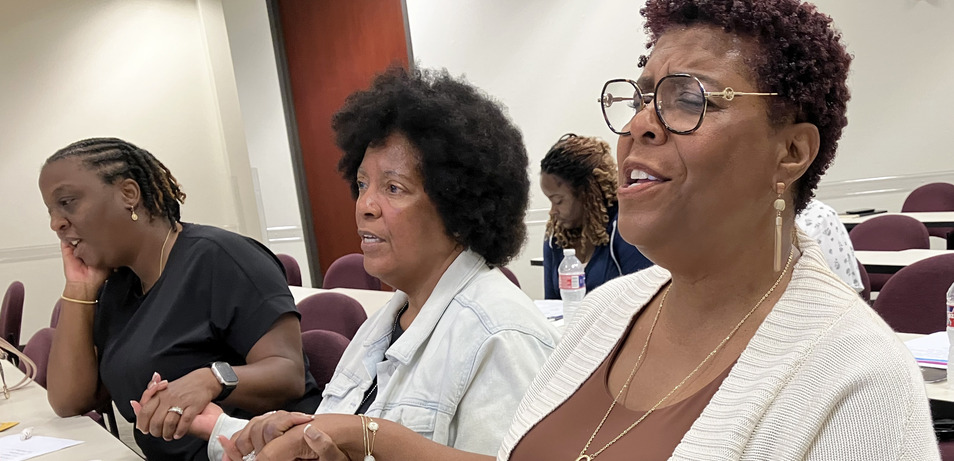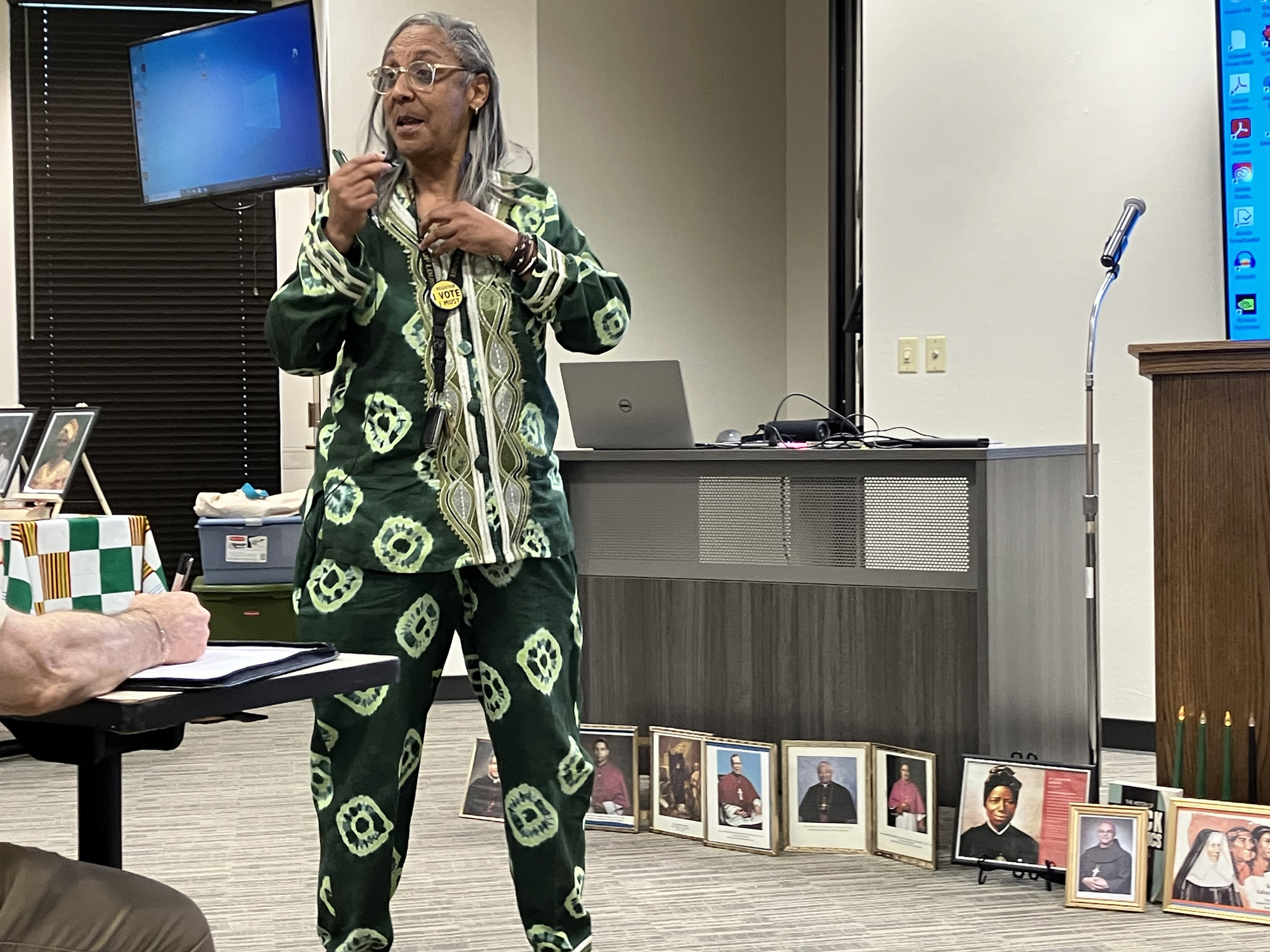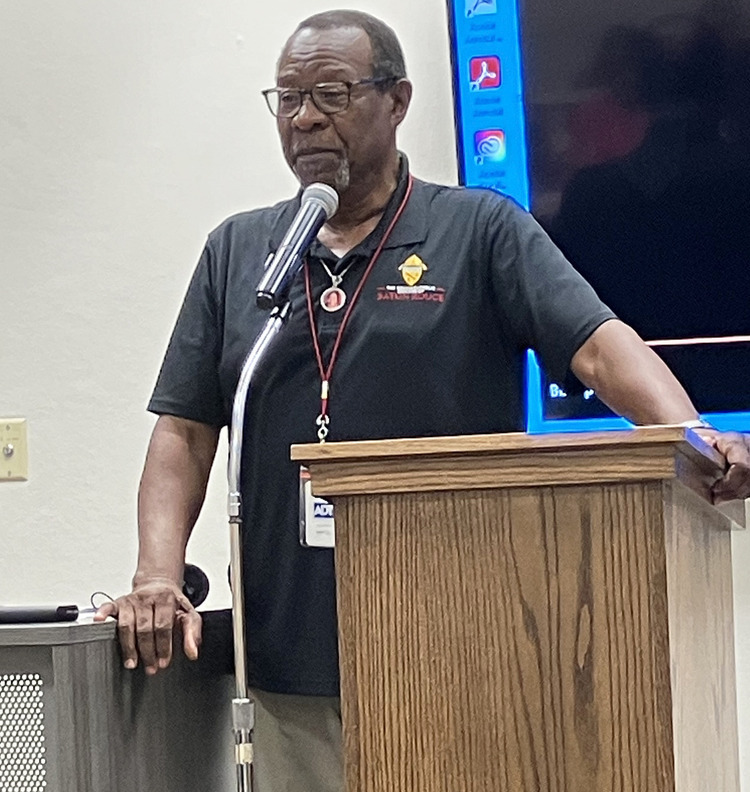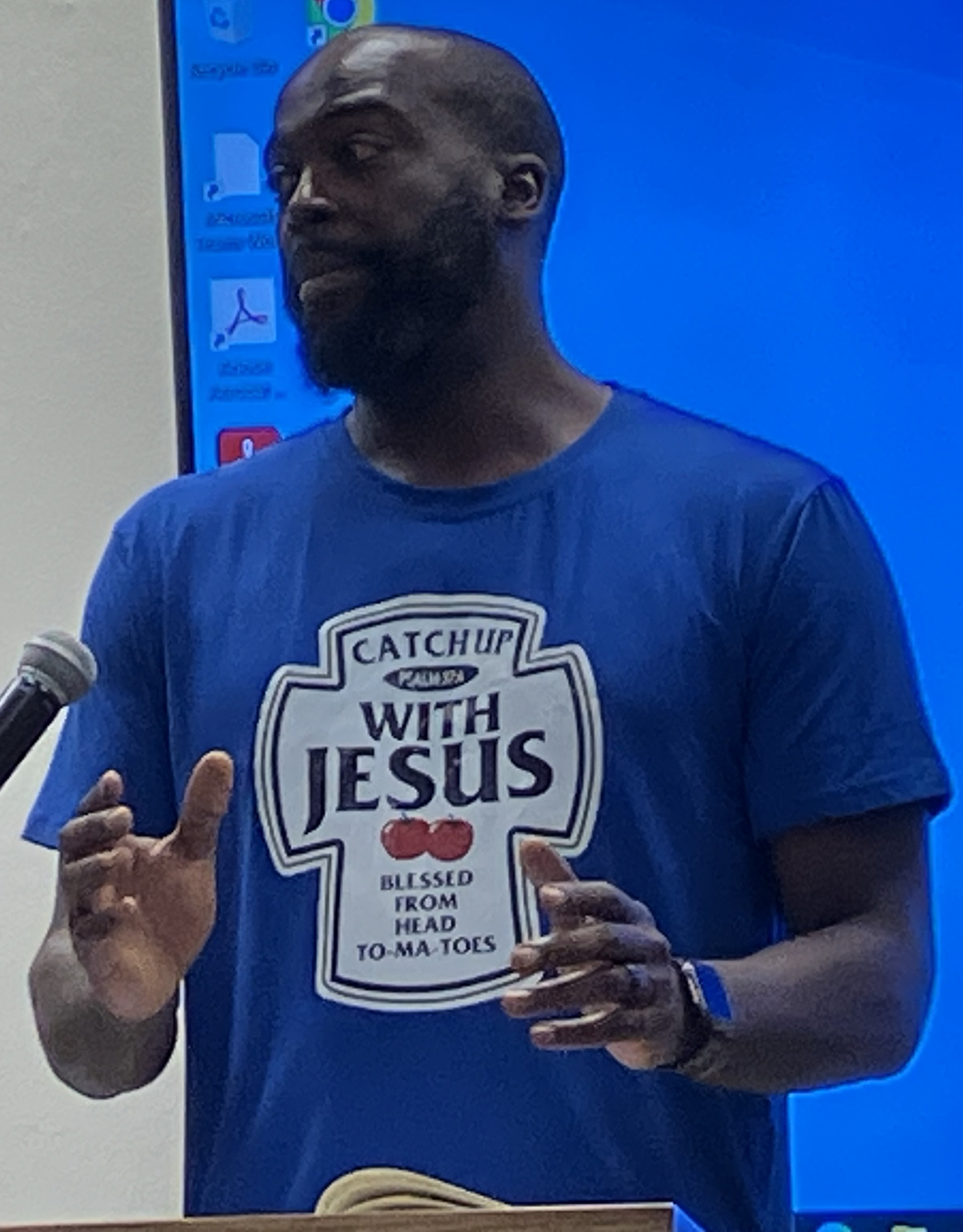Search
Richness of Black Catholic History and Culture Explored in IBCS Presentation
-
 June 6, 2025Representatives of the Institute of Black Catholic Studies (IBCS) informed people of the Diocese of Baton Rouge about its mission to help laity and clergy effectively minister in U.S. Black communities. The Office of Black Catholics of the Diocese of Baton Rouge sponsored the May 17 presentation, which took place at the Catholic Life Center in Baton Rouge.
June 6, 2025Representatives of the Institute of Black Catholic Studies (IBCS) informed people of the Diocese of Baton Rouge about its mission to help laity and clergy effectively minister in U.S. Black communities. The Office of Black Catholics of the Diocese of Baton Rouge sponsored the May 17 presentation, which took place at the Catholic Life Center in Baton Rouge.
The IBCS is a program of Xavier University of New Orleans. Its roots are intertwined with those of the National Black Catholic Clergy Caucus (NBCCC), founded in 1968, and the Black Catholic Theological Symposium (BCTS) that first convened in October 1978.
Speakers in the program spoke about how IBCS shaped their faith life.
IBCS Director Dr. Kathleen Dorsey Bellow, a practical theologian and professor who specializes in Black Catholic ministry, spoke about her developing relationship with the institute over the years.
Bellow was working with the Order of Christian Initiation of Adults (OCIA) at Immaculate Heart of Mary Church in Lake Charles when her pastor encouraged her to attend IBCS.
“He said ‘You need the theology, you need the theory, so that you can teach people in the language they can understand why you approach things differently as an African American Catholic woman,’” stated Bellow.
She packed up her car and drove to Xavier University.
“As soon as I stepped onto campus, I knew I was on holy ground,” said Bellow.
She said IBCS is a safe place to question the faith, be challenged, study, and socialize with seminarians, priests, religious women, and lay people across the country.
She graduated from IBCS and came back 25 years later to volunteer and became its director in 2019.
Black Catholics are important to the church because of their gifts, talents, and lived experienced, Bellow stressed.
“The Church needs you just as you need the Church. When you’re part of the Church, you're all part of God's body,” Bellow said. “And the Church is part of you, as you continue to place this heritage at the service of the whole Church, for the spread of the gospel, the Holy Spirit.”
Father Tom Clark, pastor of Immaculate Conception Church in Baton Rouge, graduated from IBCS 25 years ago. He has kept ties with many of his fellow IBCS classmates.
“There is no better theological preparation that you can get than at the Institute of Black Catholic Studies,” said Father Clark.
Father Clark developed a profound understanding of the Black Catholic experience and implemented what he learned IBCS.
“It gave me great insight into cross-cultural ministry, how to be a white minister in a predominately Black community, and the collaboration that requires listening, that requires learning – it’s all very wonderful.”
Kendrick Slan, lead missionary for the Baton Rouge area of Vagabond Missions, had converted from the Baptist to the Catholic faith. He wanted to know more about the connection between Black culture and the Catholic faith.
He took all the available Black history classes at the University of Lafayette, and minored in religious studies, but he still had questions. Father Clark pointed him to IBCS. This spurred Slan’s life-long passion of evangelizing. God then called him to become involved with Vagabond Missions, which invites inner-city youth into a relationship with God and others.
Many Black Catholic ministries and catechesis programs in other dioceses do not have the level of support as the ones in the Diocese of Baton Rouge do, according to Slan.
“That’s because God has a plan for our area and God has a plan for our church,” he said.
Father Rick Potts CSsR, parochial vicar for St. Gerard Majella Church, Baton Rouge, attended IBCS when he was associate pastor at St. Alphonsus Liguori “Rock” Church in St. Louis. He learned the collaborative aspect of Black Catholic ministry by working with his fellow students on a “huge amount of paperwork” to understand information.“I think it helped me get through my project and my paper, which I had a subtitle of ‘Helping Pastors Smell Like Their Sheep,’ which was affirmed every time I heard Pope Francis say that,” said Father Potts with a grin.The IBCS Institute helped him become a better pastor and understand racism.
He learned the collaborative aspect of Black Catholic ministry by working with his fellow students on a “huge amount of paperwork” to understand information.“I think it helped me get through my project and my paper, which I had a subtitle of ‘Helping Pastors Smell Like Their Sheep,’ which was affirmed every time I heard Pope Francis say that,” said Father Potts with a grin.The IBCS Institute helped him become a better pastor and understand racism.
“All of the sudden I saw racism in places I had never seen it before, and to understand the frustration that Black people have sometimes with White people of not understanding or not appreciating their contributions to the culture,” Father Potts said.
Janet St. Cyr Moor, a member of St. Paul the Apostle Church in Baton Rouge, grew up in a denominationally mixed family. Her mother was Baptist, but she raised her and her siblings in the Catholic Church. The IBCS increased her resolve to strengthen her connection with the Catholic Church.
“It was everything I thought it would be and more … It was thought-provoking, spiritually awakening, bringing forward many religious subjects, feelings, thoughts, revelations, sharing of ideas, and experiences,” Moor said.
Cassandra Will, consultant for the Office of Black Catholics for the diocese, completed her master’s degree in theology at Xavier University and attended IBCS. She talked about the global nature of the university.
“The term "Black’ has other significance. It doesn't just mean African American. That's why (IBCS) is not named the African American Institute. Because some of our professors were not Americans,” said Will. “I had a Caribbean professor. There were some professors who were Nigerian, some from other African countries. There was a student in my class who was a priest from Brazil. When we used the term ‘Black,’ you mean Black all over the world, coming from the motherland and distances far off, because all of our experiences are going to be different.”
She added, “It's very difficult sometimes to give up three weeks. However, come for a week just to whet your appetite for the Institute for Black Catholic Studies. I guarantee your fire will be lit and it's going to keep burning,” said Will.
This year’s institute is slated for June 29-July 18. For more information and to register, email [email protected], call 504-520-7691, or visit xula.edu/ibcs.
